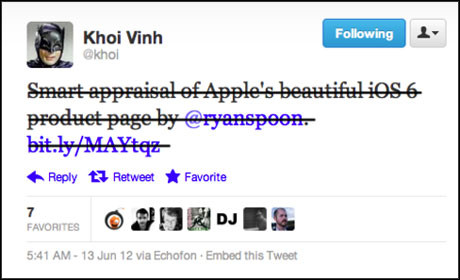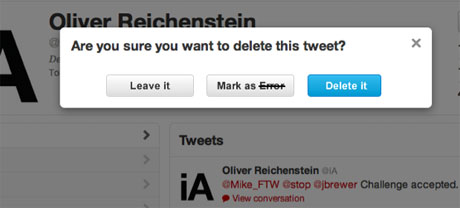
Proposal to Twitter: A strike-though option for tweets. This example had an incorrect link.
A firm of information architects has (unofficially) proposed an idea to Twitter that would see users given the ability to strike-through tweets to mark them as erroneous.
In a blog post by the agency iA, Oliver Reichenstein writes that a tweet marked as an error is a better solution than deleting tweets, which he states "smell like a cover-up and often make you look suspicious".
The post states: "A missing tweet also doesn’t explain why it’s missing. Excuses might be posted after the mistake happened — but they might also never be seen.
"The only format that clearly states a mistake is a fat strike-through. It is a strong answer to any interpretations and accusations that follow. It clearly says: 'Don’t read this. This is all wrong. I take it back. I’m sorry.' Deleted tweets don’t say that — they smell like a cover-up and often make you look suspicious. And apologetic follow-up tweets don't have the power to neutralise that screenshot of you screwing up."
He continues: "The most obvious way to deal with erroneous tweets would be to add a feature to redact them, but editing tweets would: be technically unfeasible; work against the core concept of a status streaming service; make it difficult to hold people accountable; bloat the interface."
He proposes a "comparatively simple solution" to "add a new status to tweets called 'error'".

Mark Jones, global communities editor for Thomson Reuters told Journalism.co.uk that "since you can never really delete tweets, and it isn’t possible to edit them, it’s very difficult to issue a ‘correction’ under the current system".
"The ability to use strike-through won’t solve all the problems of errors amplifying around the web but it will certainly help."
Asked for his view on the proposal, Chris Hamilton, social media editor of the BBC told Journalism.co.uk that it is "an intriguing idea and one that, on the face of it, could be useful".
"For example, for the sake of transparency, on the rare occasions we send out tweets that have to be corrected on @BBCBreaking, @BBCWorld or @BBCNews, our general rule is to avoid deletion, unless it’s a very minor error that’s been spotted quickly (like a spelling mistake).
"But sometimes leaving the original tweet, with its incorrect information, isn’t that helpful, especially if it’s still getting retweeted. So a strike-through could be a halfway option, allowing you to flag that you know the tweet is wrong, have some clarity in your timeline about why a follow-up tweet contradicts one already sent, while avoiding the charge of censorship or attempting to cover things up inherent with a deletion.
"However, I do have some sympathy with the view that Twitter has been successful precisely because it is a fairly basic service, and extra functionality like this does risk that fundamental benefit."
Markham Nolan, managing editor of Storyful, which curates social media "to create an authentic, cooperative and socially useful journalism", broadly welcomed the idea.
"It's certainly a move to self-editing and debunking of falsehoods that we'd welcome - if the major offenders actually agreed to use it."
He questioned whether it would be used by all organisations. "Will people will be willing to publicly admit that they got things wrong and leave their errors hanging there in perpetuity for all to see, when they can simply delete the tweet, apologise and be done with it?
"In any case, as Twitter users become more savvy, the shelf-life of an erroneous tweet is getting shorter and shorter.
"The crowd is more skeptical than ever, and quicker to squash hoaxes as a result, meaning a development like this would likely have pretty limited utility."
Hat tip: The Verge
- One of the sessions at news:rewired - full stream ahead will look at verification, rumour and corrections. More details about the digital journalism event are at this link.
Free daily newsletter
If you like our news and feature articles, you can sign up to receive our free daily (Mon-Fri) email newsletter (mobile friendly).
Related articles
- WAN-IFRA launches gaming tool NewsArcade with six-month free trial
- Nine AI hacks for newsroom leaders to promote employee wellbeing
- Updated global directory features 3,000 independent digital media companies
- Nine AI tools for journalists to try this summer
- Tool for journalists: Story SpinnerAI, for generating story angles based on user needs









